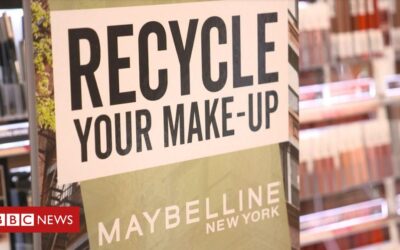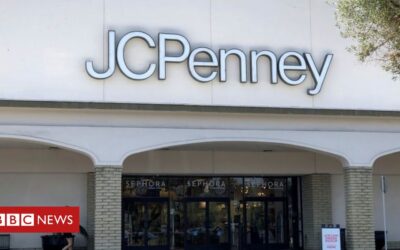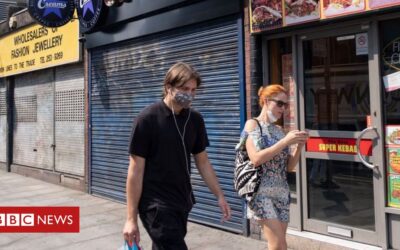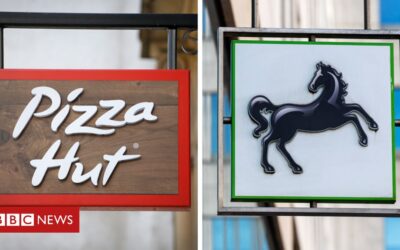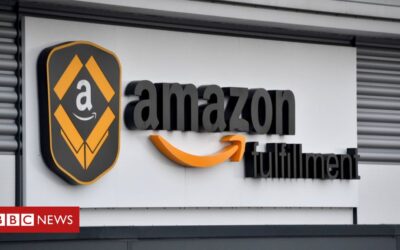Cosmetics giant L’Oreal is introducing make-up recycling bins across 1,000 UK stores in an environmental push.Its Maybelline brand and recycling firm TerraCycle will install the recycling points in branches of Tesco, Boots, Sainsbury’s and Superdrug.L’Oreal’s UK boss said the firm wants to “lead the way” in creating beauty recycling habits.But Greenpeace said without reducing single-use plastic production, firms “cannot claim they are doing enough”.From Thursday, consumers can drop off empty make-up products from any brand at the recycling bins in participating Tesco and Superdrug stores, which can be found online.Boots and Sainsbury’s will follow at the end of September.Selfridges to offer clothing rental in environmental push
Morrisons considers ditching all ‘bags for life’ for paper
Compacts, eyeshadow palettes, foundation or concealer tubes, mascara, eyeliner and lip products will be accepted, although make-up brushes, nail polish and aerosols will not.The used items will be collected from the shops, sorted, cleaned and recycled into plastic pellets, which can be used to make other products, such as outdoor furniture.Chains such as The Body Shop and skincare specialist Kiehl’s – also owned by L’Oreal – already offer customers rewards for returning empty products to stores to be recycled.Vismay Sharma, country manager of L’Oreal UK and Ireland, told the BBC that the firm had the “ability to make impact at real scale”.Nearly half of make-up wearers did not know that recycling beauty products was possible, according to a recent survey of more than 1,000 consumers by Maybelline.Asked what differentiates Maybelline and TerraCycle’s new “Make-up Not Make Waste” scheme from other similar ones, Stephen Clarke, head of communications at TerraCycle, said that the number of stores participating meant it would be easier for consumers to recycle their beauty buys.He also said the firm can recycle mixed materials, such as compacts with mirrors, as well as beauty items with pumps and triggers, which local councils won’t necessarily do.’Damaging our planet’However, environmental campaign group Greenpeace said that “recycling will only ever get us so far”.Will McCallum, head of oceans at Greenpeace UK, said: “Given the almost daily torrent of research revealing the extent to which plastic pollution is damaging our planet, it’s frustrating to see a major plastic producer like the make-up industry fail to commit to reduce its overall plastic footprint.”Without action plans to move towards reusable packaging and reduce single-use plastic production, companies cannot claim they are doing enough.”More than 120 billion units of packaging are produced globally every year by the cosmetics industry alone, according to the Zero Waste Week campaign.L’Oreal told the BBC that its global consumption of plastic totalled 137,000 tonnes in 2019.The cosmetics firm has pledged that 100% of its plastic packaging will be refillable, reusable, recyclable or compostable by 2025.Mr Sharma also said that the firm was dedicating €50m (£45.4m) to investing in recycling or plastic waste-related projects.
BBC Business News Articles
Trade talks: Why chicken, cheese, and cod are a tricky menu
Coronavirus permitting, there’ll be fireworks and parties to mark the arrival of 2021.But as the clock strikes midnight, it’ll also mark the end of the Brexit transition period. Trading relationships that have been in place for years will go up in smoke. Civil servants are racing against the clock to replace these relationships with something even more dazzling and befitting of modern “Global Britain”.This week trade negotiators will pursue simultaneous talks with three key UK partners – the United States, Japan and European Union (EU). If they fail, businesses and households could pay a high – and very unwelcome – price. What is the UK trying to do?It’s been called “cherry-picking” by Brussels. But the UK government would see its negotiations there as trying to replace its existing relationship with the EU with one that suits its needs better, while trying to avoid the imposition of tariffs where there are currently none. With the US, it’s designing an arrangement from scratch. And in the case of Japan, it’s simply replicating a deal that that country already has with the EU – with a few added extras, such as agreements on digital trade.What are the sticking points?Trade deals aim to increase the choice of what’s available from other countries – and lower prices. But that has to be balanced by protecting the needs of businesses at home. And this is the tricky bit.While the UK has managed to largely replicate the EU’s deal with Japan, the issue of cheese, such as Stilton, has caused a stink. Britain wants better access for its cheese farmers; Japan isn’t keen. Is this really worth the strife, given that Japan only buys about £2m worth of British cheese? Well, it’s not about the current picture, but the potential for growth. Ditto the US and its chickens. America has made no secret of the fact that it wants its farmers to have a bigger presence on British plates. That’s currently up for discussion, and may cause ructions.But what isn’t being negotiated is a lowering of standards to American levels – such as the conditions in which chicken can be raised, the reason they’re rinsed in chlorine. That responsibility falls to the UK Food Standards Agency. And hard to swallow in Brussels has been the UK’s demand for the right to catch more fish in surrounding waters. Fishing makes up less than 0.2% of the UK economy – but, again, it’s about the potential gains. And it’s about keeping voters happy: trade deals are as political as they are economic. So even talks over small-fry matters mean trade deals take years to hammer out.
Media playback is unsupported on your device
What are the chances?Ambitions that a deal with Japan, Britain’s first major trophy in the Brexit era, could be sewn up by the end of July were dashed. And that’s with a partner that accounts for just 2% of British exports. We’re edging closer to the finish line, but it doesn’t bode well for talks elsewhere.Meanwhile, hopes for a deal with the US, which buys almost a fifth of British exports, ahead of the November election have faded. Officials are now quietly pinning their hopes on an agreement by next spring.As for the EU, the continued impasse where there was once an aim of a deal by October has seen the chances of a no (trade) deal rise sharply.What if there’s no deal?If there is no agreement by the end of the year, those countries’ imports will face the same charges and rules as those from any other nation with which the UK doesn’t have a deal. They’ll have the new UK Global Tariff imposed on them. Crucially, that would mean that over half of good imports, by value, from the EU would face extra charges, compared with none at present.The biggest rises would be in the price of cars, and foods such as lamb and beef, where tariffs are being retained to protect British producers. The British Retail Consortium has warned of price hikes on staples from olive oil to cucumbers.Under a previous no-deal plan, the Office for Budget Responsibility reckoned the total cost of tariffs could mount into the billions – and that’s with fewer tariffs than now envisaged. Those costs would be born by businesses and households, squeezing budgets and the ability to create jobs, when the economy least needs it. And that’s before taking into account the cost of planning for businesses and potential for delays at the border.
JC Penney: Landlords plot rescue for department store
Two of America’s biggest shopping mall owners have agreed to take on JC Penney’s retail operations to save the department store from closing.Simon Property Group and Brookfield Property Partners said they would keep the majority of JC Penney’s stores open, potentially saving 70,000 jobs.JC Penney had about 850 sites and employed more than 80,000 people when it declared bankruptcy in May.The plan marks the landlords’ latest efforts to fend off retail’s struggles.Last month, Simon Property Group announced deals with other partners to buy clothing firms Brooks Brothers and Lucky Brand Jeans, which had filed for bankruptcy after mass store closures triggered by the coronavirus pandemic.In February, Simon also teamed up with Brookfield to buy Forever 21, after the clothing chain declared bankruptcy.Retail strugglesThe woes of JC Penney, founded in 1902 in Wyoming, also predate the pandemic. The company thrived during the 20th century, growing to become a staple of shopping malls throughout the United States. But competition from online shopping and other rivals saw sales slide in recent years.The firm has since closed hundreds of stores and cut thousands of jobs. Last year it reported sales of $10.7bn (£8.2bn), a decrease of more than $7bn in 10 years. The pandemic hastened that decline, forcing the temporary closure of its stores. It has since closed more than 150 locations.The tentative deal to buy JC Penney, which requires court approval to move forward, would see Simon and Brookfield invest about $300m into the company and assume $500m in debt, a lawyer for the company said at a court hearing on Wednesday.The firm is also seeking new financing, while other companies are expected to win ownership of roughly 160 stores, in exchange for forgiving some of the JC Penney’s $5bn debt load. About 650 stores are expected to stay open.JC Penney, which had warned previously that rescue talks were not going well, said it planned to seek court approval of a final deal in October. “There have been twists and turns but I think we are at a place now where we have significant momentum behind us,” attorney Joshua Sussberg said. “Simon, Brookfield, the lenders and the company, the creditors committee are all committed to moving this forward quickly and saving JC Penney as we know it.”
Local lockdown business grants 'not enough', says lobby group
Grants for English firms forced to close in local lockdowns “will not be enough” to bail them out, the British Chambers of Commerce (BCC) has said.The government unveiled the grants – worth up to £1,500 every three weeks – on Wednesday amid warnings of rising coronavirus infections.Chief Secretary to the Treasury Stephen Barclay said they would be a “lifeline” for struggling companies.But the BCC said more help was needed to protect businesses and jobs.This week, restrictions were tightened in Bolton and Caerphilly amid spikes in infections. It follows local lockdowns in other areas including Leicester, Burnley, Hyndburn and Stockport.But there have been complaints that firms in such areas get no extra support, despite having to shut their doors to the public.UK banks get 100,000 loan applications on first day
Social gatherings over six to be banned in England
Mr Barclay said he understood the impact “these local measures have on people and businesses” as he announced the grants.He told Parliament: “Closed businesses with a rateable value of £51,000 or less will receive a cash grant of £1,000 for each three-week period they are closed.”For closed businesses with a rateable value higher than £51,000, the grants will be £1,500.”The grants will cover each additional three-week period, so if a small business is closed for six weeks, it will receive £2,000.”This new support will give closed businesses a lifeline through the difficult, but temporary, experience of lockdown.”He said the grants could be used in conjunction with the low interest bounce-back loans available to firms in crisis.However, the BCC said more help was needed as more than one in three of its members have three months or less worth of cash in reserves.”Businesses forced to close through no fault of their own will welcome any new grant support, but for most this will not be enough to offset the resulting cash crunch,” said director general Adam Marshall.”Ministers should increase the amount on offer to ensure businesses and jobs are protected, and extend coverage to more firms that are hard-hit but not forced to close.”
Lloyds Bank and Pizza Hut cut more than 1,000 jobs
Lloyds Banking Group and Pizza Hut are the latest firms to announce job cuts during the coronavirus pandemic. Lloyds said it was cutting 865 jobs in areas such as insurance and wealth management as it revived plans to restructure the business.Separately, Pizza Hut is planning to close 29 restaurants with the loss of 450 jobs. The restaurant chain said it was part of a rescue deal “to mitigate the financial impact of Covid-19”. A raft of businesses have announced jobs cuts and closures as consumer demand has dried up during the crisis. British employers planned more than 300,000 redundancies in June and July alone, as the country slipped into its sharpest recession on record. Lloyds, which has about 65,000 employees, had warned of cuts in January but put them hold until the autumn due to the crisis. Coronavirus: 300,000 redundancies planned in June and JulyWhile it is cutting posts, it also said it would create 226 roles and would try to redeploy people.However, the Unite union said that it was worried about employees entering a jobs market “during very challenging times”.”The pandemic has demonstrated the amazing resilience and flexibility of this workforce,” said Unite national officer Rob MacGregor. “The employer should not focus solely on cutting jobs and costs but instead the bank should invest in a workforce that has only shown loyalty, dedication and hard work through the good times, and the bad.”‘Difficult time’Pizza Hut said it had faced “significant disruption” from the pandemic and would have to close 29 of its 244 UK restaurants. It did not say which sites would close. It said the planned cuts would leave it with 5,000 employees.”Despite a quick, Covid-safe reopening, sales are not expected to fully bounce back until well into 2021,” it said.”We understand this is a difficult time for everyone involved,” it added.Hospitality has been one of the sectors hardest hit by the crisis, despite restaurants and pubs getting ga boost in August from the government’s Eat Out to Help Out scheme.A growing list of restaurant chains have had to announce closures in recent months including Pizza Express, Byron Burger and Frankie & Benny’s-owner the Restaurant Group.Industry body UK Hospitality says around a third of restaurants and bars have still not reopened despite the easing of lockdown, as people remain nervous about the spread of the virus.
LVMH scraps Tiffany takeover citing tariff fight
French luxury goods giant LVMH has said it is pulling out of a high-profile deal to buy US jeweller Tiffany & Co.The firm said its decision came after a request by the French government to delay the takeover due to tariff threats from the US.LVMH had already said it was taking another look at the $16.2bn (£12.5bn) deal, which was struck before the coronavirus pandemic hit.Tiffany said it was filing a lawsuit to force the deal to go forward.It accused LVMH of deliberately stalling to avoid completing the deal and questioned the firm’s bid to pin its decision on the tariff dispute, saying it was a sign LVMH had “unclean hands”.”We believe that LVMH will seek to use any available means in an attempt to avoid closing the transaction on the agreed terms,” said Tiffany chairman Roger Farah.Doubts about the dealLVMH’s billionaire chief executive Bernard Arnault had long coveted buying Tiffany, a brand that hit global fame after the 1961 Audrey Hepburn film Breakfast at Tiffany’s.In November 2019, after back-and-forth, he agreed to pay $135 a share, promising to restore the lustre of the jeweller’s brand, which had been losing favour among younger buyers.But questions about the impact of coronavirus – which has slammed revenue in the luxury sector and prompted a 36% drop in Tiffany sales in the first half of the year – cast doubt over the deal.Louis Vuitton ties knot with jeweller Tiffany
Louis Vuitton casts doubt over $16bn Tiffany bid
In its statement, LVMH, which already owns about 75 brands including Christian Dior and Dom Perignon, said “a succession of events which undermine the acquisition of Tiffany & Co” had prompted the board to review the situation.It said the board had concluded it would be unable to complete the deal by the closing deadline of 24 November outlined in the 2019 merger agreement.”As it stands, the Group LVMH will therefore not be able to complete the acquisition of Tiffany & Co,” it said.Legal fightLVMH said Tiffany had asked to extend the closing date and the board had been directed by the French government to defer the acquisition until after 6 January “in reaction to the threat of taxes on French products by the US”.But Tiffany accused LVMH of not doing its part to win approval of the deal from antitrust authorities. “This latest development represents nothing more than LVMH’s most recent effort to avoid its obligation to complete the transaction on the agreed terms, not dissimilar from LVMH’s baseless, opportunistic attempts to use the US social justice protests and the Covid-19 pandemic to avoid paying the agreed price for Tiffany shares,” the firm said.Tiffany added that its business remained strong, with sales in the last three months of 2020 expected to exceed the same period last year.Tiffany shares fell more than 10% on the news to less than $110, while LVMH shares dipped slightly.
Amazon pays £290m in UK tax as sales surge to £14bn
Online retail giant Amazon paid £293m in tax in the UK last year, while its sales surged 26% to £13.73bn.The firm, which employs 33,000 people in the UK, said the taxes included business rates, corporation tax, stamp duty and other contributions. Amazon and other tech firms have faced scrutiny over how much tax they pay in the UK, prompting the government launch a tough new digital sales tax in April. Amazon said it pays “all taxes required in the UK”.”We are investing heavily in creating jobs and infrastructure across the UK – more than £23bn since 2010,” the company said in a statement. “We pay all taxes required in the UK and every country where we operate,” it said.”Corporation tax is based on profits, not revenues, and our profits have remained low given retail is a highly-competitive, low margin business and we continue to invest heavily.”Amazon to create 7,000 UK jobs
Amazon tax bill cut by share awards
In April, the UK launched a 2% tax on digital sales amid concerns that big tech firms we re-routing their profits through low tax jurisdictions. Defending the plan, Chancellor Rishi Sunak said in June that the coronavirus crisis had made tech giants even “more powerful and more profitable”.He added that firms like Google, Amazon and Facebook needed “to pay their fair share of tax”.Amazon has been expanding in the UK this year, as more people shop online due to lockdown restrictions. The company said last week it would create a further 7,000 UK jobs this year to meet growing demand, taking its total permanent workforce to 40,000 by the end of the year. It is also recruiting 20,000 seasonal posts for the festive period. Amazon is led by world’s richest man Jeff Bezos, whose personal fortune rose as high as $200bn (£155bn) in recent weeks as tech firms’ stock market valuations soared. The company as a whole posted sales of $281bn for 2019 and net profits of $11.6bn.
Rio Tinto: Church of England condemns Aboriginal destruction
Pressure is mounting on Rio Tinto’s boss after the Church of England added to condemnation of the mining giant’s destruction of an Aboriginal site.The issue will be discussed at a Rio board meeting on Thursday amid calls that heads should roll.An ethics director on the Church’s pensions board stopped short of calling formally for Rio chief Jean-Sebastien Jacques to resign.But he told the BBC that Rio’s response so far was inadequate.The Church’s pension fund has a small stake in Rio. Adam Matthews, director of ethics and engagement on the pensions board, told the BBC’s Today programme that the destruction of the 46,000-year-old cultural site in Western Australia had left the company in “a dreadful position”.Rio Tinto, one of the biggest companies listed on London’s FTSE 100, says it had permission to blow up two caves at Juukan Gorge.But after an internal inquiry, the world’s second largest miner took measures that included cutting bonuses for directors, including Mr Jacques, and attempts to repair relations with Aboriginal communities.However, Mr Matthews said he had told Rio chairman Simon Thompson that it was “clear investors don’t feel the measures the board has currently outlined are significant”.He told the BBC that Thursday’s board meeting will “be a test” of Rio’s reaction to the growing outrage, adding that “we know there is some disquiet” among other directors at the company’s response so far. There have been reports of boardroom rows.Mr Matthews said Rio’s internal inquiry had revealed it received warnings about the cultural significance of the site, but the company proceeded with the destruction anyway. “The inquiry revealed a litany of mistakes,” he said.’Deep regrets’He said Rio’s approach to the site, where the company is expanding iron ore production, displayed an attitude widespread in the mining sector, and had led to indigenous communities being blighted throughout the world.It was revealed last week that in the days running up to the caves’ destruction in May, Rio hired lawyers in case opponents tried to seek injunctions to stop them. Although Rio said it had permission for the work under Aboriginal heritage laws, critics say it suggests the company was well aware of the site’s cultural importance.Rio has a section on its website devoted to its response to the destruction. It says: “We deeply regret the events at Juukan Gorge and have unreservedly apologised to the Puutu Kunti Kurrama and Pinikura people. The destruction of the rockshelters should not have happened, and we are absolutely committed to listening, learning and changing.”Rio bosses lose bonuses over Aboriginal cave blastMining firm sorry for destroying Aboriginal cavesBut the apology has not assuaged many investors in Australia, who have strongly criticised Rio. AustralianSuper, the country’s largest pension fund, has said financial sanctions against directors are not enough. And the Australian Council of Superannuation Investors said directors’ accountability needed to go “further than just a financial penalty”.Rio has also been accused of misleading a parliamentary inquiry into the destruction.Mr Jacques, aged 48, has been Rio’s chief executive since July 2016. Last month, he received strong backing from the chairman to lead the company through the crisis.
David Beckham's Guild Esports to float on London stock market
An e-sports company in which David Beckham owns a significant stake is seeking to raise £20m by listing its shares on the London Stock Exchange.Guild Esports will be the first in the UK to offer fans the chance to put money into backing its teams of gamers.Esports, where spectators watch players video gaming, has seen its popularity rise even further during lockdown.The company plans to field teams in the global online games Fortnite, CS:Go, Rocket League and Fifa.It wants to build up its teams’ skills using systems similar to the Premier League’s talent academics.Prize and sponsorship money for e-sports run in the millions and audiences run to more than 100 million for some events, outstripping those for major sporting events such as Wimbledon and the Tour de France. Guild Esports said that by 2019, e-sports had a total of 443 million viewers, and the market is projected to grow to 646 million viewers by 2023. ‘Global influence’The shares will initially be offered to large investors next month, but afterwards will trade freely on the stock market where anyone can buy them.Money raised from the initial share placing will be used to expand the business, including recruiting new players.The investment further extends David Beckham’s wide-ranging business interests, which include fashion, fragrances, whisky and a football club in Florida that he co-owns. Guild Esports said he would use his “global influence and following to support the development of the company’s brand and business”.Beckham is one of the founding shareholders in the business, holding what is described as a “significant minority stake”, although the exact investment is undisclosed.He is not the first footballer to spot the potential opportunities in e-sports. Wales and Real Madrid player Gareth Bale launched his e-sports organisation, Ellevens Esports, earlier this year.Carleton Curtis, the executive chairman of Guild Esports, said: “Guild will be the first e-sports franchise to join the London stock market.”It will provide us with the cache, credibility and capital to fulfil our ambition to become one of the world’s top 10 e-sports franchises within three years.”
Ryanair boss Michael O'Leary calls UK travel quarantine 'a shambles'
The UK’s travel quarantine policy is a “shambles of mismanagement”, Ryanair boss Michael O’Leary has said.In an interview with the BBC, Mr O’Leary said the UK and Irish Governments “stand indicted”.He said the UK quarantine was “lumpy and defective” and that the UK needed to use testing at airports to help the safe return of international travel.Boris Johnson has said travel quarantines are “vital” to fight Covid-19 as testing can be unreliable. The policy requires travellers to high-risk countries to isolate for two weeks on their return to the UK.Mr O’Leary described the record of the UK government as “pretty poor in almost all respects of dealing with Covid”. “They were late into lockdown, they were late into testing, they were late into face masks, now they’re pooh-poohing testing. Testing is the only way forward here.” He cited the Italian and German governments, who allowed intra-European travel from 1 July, as managing the virus well thanks to “a much more aggressive test and trace system”.Mr O’Leary said he supported a two-test system, where a passenger would be tested on arrival at an airport and then tested five days later, and if they got two negative tests they would leave quarantine early. UK government sources have indicated that they are looking at system where the two tests would be eight days apart to further minimise the risk of “false negative” results. But Mr O’Leary said a two-test system mitigated against business travel, noting: “The City of London depends on this type of travel.” He also said that the UK tourism sector needed European visitors, and he questioned why the UK was relying on a “failed quarantine” policy rather than a better test-and-trace system and testing at airports. “You’re much more likely to get Covid in Bolton rather than Barcelona,” he said.Asked whether he had spoken to the Transport Secretary, Grant Shapps about all of this he said: “Honestly, talking to Grant Shapps is a waste of time… he is the messenger boy for whatever goes on in Number 10 Downing Street.” When asked if he had talked to anyone in Number 10, Mr O’Leary said: “I wouldn’t waste my time talking to anyone in the UK government at the moment given their abysmal record at mismanaging Covid.” He claimed that short-haul intra-European business travel and visits “will return very quickly, once there is an identifiable vaccine”. Last week the prime minister appeared to pour cold water over the idea of tests at airports, saying it would only identify 7% of Covid-19 cases.”That’s why the quarantine system that we have has got to be an important part of our repertoire, of our toolbox, in fighting Covid,” he said.”What we don’t want to see is reinfection coming in from abroad and quarantine is a vital part of that.”

